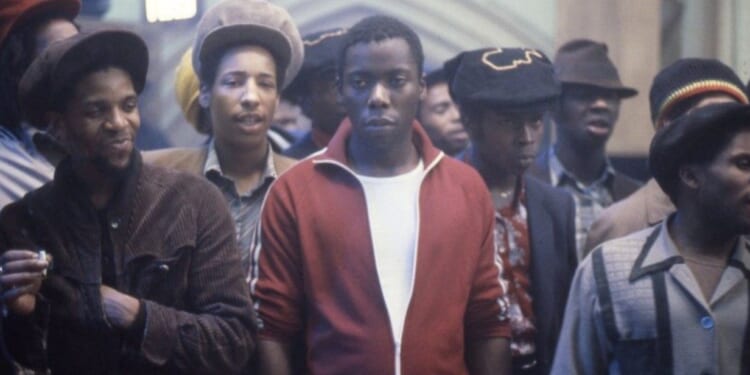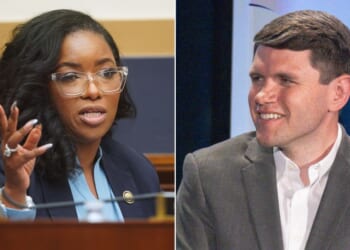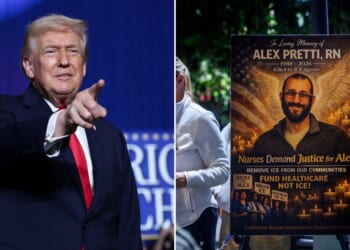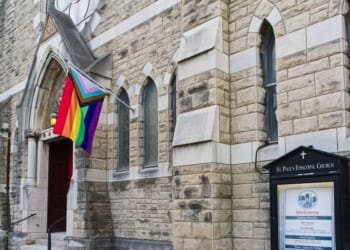All national myths are part truth, part invention. They serve the narratives that a country wishes to tell about itself at a particular time. For America, Ellis Island symbolises the immigrant pursuit of the “American dream” and the creation of a melting-pot society in the late 19th and early 20th centuries. Multicultural Britain has its own version: Windrush.
The Windrush generation — Caribbean migrants who arrived between 1948 and 1971 — has become emblematic of Britain’s journey to multiculturalism. Since the Nineties, Windrush has been elevated in public memory, replacing “1066 and all that” with a newer myth: Britain as a nation of immigrants. We now have monuments in Waterloo station and the new Windrush trainline to boot.
So, Keir Starmer can now assert that the Windrush generation “laid the foundations for modern Britain”. There are, of course, grains of truth in this statement. Many of the Windrush migrants worked in the newly established NHS and helped fill labour shortages in the postwar period. But this liberal origin story not only provokes derision from the Right who regard it as a rationalisation of mass immigration but it also skirts around the continued racism those migrants and their descendants have been subjected to. Only seven years ago, Britain was rocked by the wrongful detainment and in some cases deportation of Windrush-era migrants, known as the Windrush scandal.
A striking irony, however, has begun to emerge. Some elements of the political Right have started to almost romanticise the Windrush generation they once disparaged, now held up as the “right” kind of immigrant in the aftermath of the radicalising “Boriswave”.
The postwar demographic mix that Windrush once symbolised has been overhauled in the past 30 years, and more intensely so in the last few years due to the accelerated pace of immigration under the Conservatives. A white British super-majority with a few small ethnic minority groups, largely drawn from Commonwealth countries, has given way to what the sociologist Steven Vertovec labels “super-diversity”: immigration from a much broader range of countries. As a result, what Stuart Hall once called “multicultural drift” has become more pronounced. The white British population has declined from 95% in 1991 to 75% in 2021. In the words of the historian Kieran Connell in his Multicultural Britain: “by the 2040s, there will likely be no one left with any memory of Britain before the twin processes of growing immigration and widespread ethnic diversity.”
As part of this shift, the Caribbean population has also been in decline. In 2001, it constituted half of the black population in England and Wales; today that figure is closer to a quarter. Meanwhile, over the same period, Africans have gone from representing 40% of that population to 62%. As Tony Sewell recently bemoaned, British Caribbeans “may well be extinct before 2060”. The cultural signifiers have altered too. Footballers such as Ian Wright and Paul Ince, celebrities including Lenny Henry and Ainsley Harriott, and Ska and reggae music, once defined black Britain. The Caribbeans owned the slang, the style, and the music. But now, as Sewell puts it, “rice and peas has had to give way to Jollof rice”. The faces of black Britain today have recognisably African names: Bukayo Saka, Maya Jama, Kwasi Kwarteng and Kemi Badenoch. The Windrush generation, once seen as the vanguard of black British identity, seems like part of a fading historical moment.
Being Anglo-Nigerian myself, I’m just about old enough to remember when British blackness was Caribbean in character. It wasn’t “cool” to be African. As Skepta put it: “When I was in school being African was a diss, sounds like you need help saying my surname, miss.” Over the past decade or so, there has been a quiet revolution in black Britishness. Afrobeats has gone mainstream: the Azonto dance has colonised nightclubs, and even white yuppies began to listen to Fuse ODG to show how hip they were. Many British Africans arrived more recently, often with stronger ties to their post-colonial homelands. As black Britishness becomes more heterogeneous, some Brits may find that the newer African cultures are less familiar than the Caribbean culture they grew up with.
“I’m just about old enough to remember when British blackness was Caribbean in character.”
This demographic shift has reframed questions of integration. Tommy Robinson, whose Unite The Kingdom rally last month strikingly concluded with a black gospel choir, has over the years used Caribbeans (alongside Sikhs and Hindus) as examples of integration in contrast to Muslims. Speaking on the Heretics podcast, Robinson attempted to swat away accusations of racism by referring to Ian Wright as an example of Englishness: “Are you telling me Ian Wright is not English?” More moderate figures such as Trevor Phillips have begun to argue that the Windrush generation integrated more successfully than recent arrivals, while failing to mention the length of time that Afro-Caribbeans have been in Britain. Caribbeans, he notes, were “steeped in the behaviours of the British”, by which he means they were Christian, English-speaking, and their ancestors were given a colonial British education.
There is some history behind that idea. In 1996, Diane Abbott caused controversy by lamenting the decline of Caribbean nurses in her local Hackney hospice as they “know the language and understand British culture and institutions”, contrasting them with the “blonde, blue-eyed girls from Finland”. Although her comments were derided, they reflected a real perception that Afro-Caribbeans had finally been accepted into the British body politic.
But the reality has been somewhat more complicated. The Windrush scandal, and the Home Office’s creation of a “hostile environment”, is perhaps the most glaring example of this fraught history. And while Notting Hill Carnival, which celebrates Caribbean culture, is now a staple of multicultural Britain, that wasn’t always the case. The 1976 Carnival riots set in motion stereotypes of black youth as promiscuous troublemakers, and led to the strategic use of the “Sus laws” to criminalise them. To this day, the Right-wing press panics about the levels of violence and crime at the Carnival, with calls to ban it or move it to Hyde Park.
Even so, it is worth interrogating why the Right might claim to view the Windrush-era migrants differently today. Immigrant communities in Britain have arguably followed two paths of integration. On the one hand, there is the Irish path: high intermarriage rates and eventual absorption into the majority group. On the other, there is the Jewish route: economically intertwined but culturally and religiously distinctive. The former resembles assimilation, the latter integration.
Afro-Caribbeans, it seems, have followed the Irish example. They have some of the highest rates of interracial relationships, particularly with white Britons. In fact, the most common interracial coupling in Britain is between Caribbeans and white English people. This happens to such an extent that some within the Caribbean community are concerned about their long-term survival. By contrast, British Asians and British Africans tend to follow the Jewish model. They marry into the white majority less frequently and maintain stronger cultural boundaries: from speaking “home languages” (Yoruba, Igbo, Punjabi and Urdu) to giving non-Anglicised names to their children and staying connected to cultural media like Nollywood for Nigerians and Bollywood for South Asians. Differences in gender roles, alcohol consumption and social habits have further complicated integration. Take the example of “dessert parlours”, which emerged in British cities and towns with high Muslim populations, and function as dry pubs.
Unlike South Asians and Africans, Caribbeans were more thoroughly — and forcefully — anglicised due to slavery and colonial proximity. This has not translated into social equality, but it helps to explain why Afro-Caribbeans are more likely to identify as “English” while South Asians and Africans often choose the broader, civic label of “British”. With fewer cultural and religious barriers — and less pressure to marry within their community — Afro-Caribbeans have blended more into the national fabric.
Even though “political blackness” emerged in the Seventies as a catch-all term for all non-white people facing racism in Britain, the forms of discrimination varied. Caribbeans were targeted primarily for the colour of their skin, while British Asians faced both racial and cultural discrimination. Interviews with skinheads from the Seventies reveal these complex dynamics: many expressed less hostility towards Jamaicans than Pakistanis, mentioning shared musical and cultural tastes like reggae and ska music. The form of racism may have differed, but not the extent.
And so, as Britain’s demographic landscape changes again, so too do the narratives around immigration and blackness. Because of my own ethnic identity, I have been unconsciously part of this quiet revolution in black Britishness. Simultaneously, I am a son of England and of the decolonised British empire. But the succeeding generations of British-Africans might face a more prolonged battle — to be treated unambiguously as belonging to these isles and not as glorified “guests”. I pray it won’t be as tortuous as what the Windrush generation went through.

















